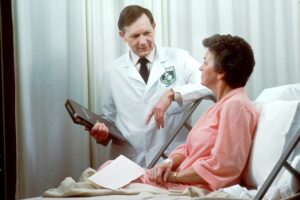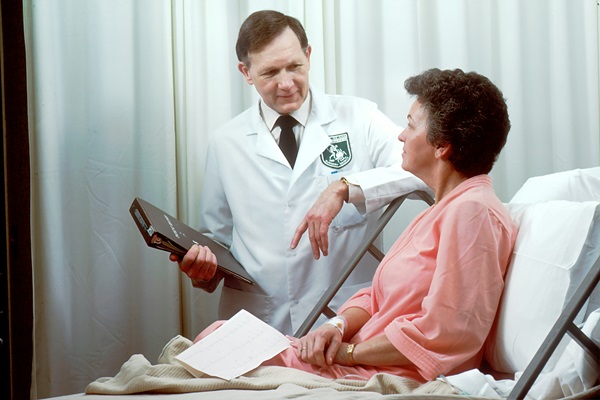 Colon cancer is the second leading cause of cancer deaths in the U.S., yet many patients and their families don’t realize that one in 10 colon cancer cases are inherited and genetic testing can help determine if there is risk to others in a family. The number of at-risk individuals who seek genetic counseling for colon cancer is much lower than in families where there is an incidence of breast cancer, even though the inherited forms of the two cancers occur with similar frequency.
Colon cancer is the second leading cause of cancer deaths in the U.S., yet many patients and their families don’t realize that one in 10 colon cancer cases are inherited and genetic testing can help determine if there is risk to others in a family. The number of at-risk individuals who seek genetic counseling for colon cancer is much lower than in families where there is an incidence of breast cancer, even though the inherited forms of the two cancers occur with similar frequency.
“There are many signs that point to the possibility that a colon cancer is of the type that can be passed on to your kids — or inherited from your parents, depending on who has the cancer,” said Steve Keiles, president of the National Society for Genetic Counselors (NSGC).
Possible Signs
• A colon cancer occurring in a person younger than 50.
• More than 10 colorectal polyps, or precancerous growths in the colon, detected during a colonoscopy or other tests.
• Presence of a second cancer in addition to colon cancer (especially if ovarian, endometrial or stomach cancer).
• Having at least two close family members with colon cancer on the same side of the family, especially if one is diagnosed before the age of 50.
• Individual with a known family history of an inherited form of colon cancer called polyposis syndrome.
“Individuals who meet any of these criteria, or have close family members who do, should consider consulting a genetic counselor who can perform a risk assessment and determine if they or their families are candidates for genetic testing,” says Keiles. “The majority of individuals will not have an inherited form of colon cancer; however risk assessment by a trained genetic professional is essential before any further testing is performed.”
If the results of the genetic test show a person is at high risk for inherited colon cancer, he or she will want to take steps to lower the risk by making lifestyle changes, such as engaging in at least 30 minutes of daily exercise and avoiding foods high in fat and cholesterol. It is common for some individuals to be advised to have an annual colonoscopy, flexible sigmoidoscopy, barium enema, or blood stool testing, all of which can catch colon cancer at its earliest most curable stage.
The most common hereditary colorectal cancers include Lynch syndrome (also known as hereditary non-polyposis colorectal cancer or HNPCC), familial adenomatous polyposis (FAP) and MYH-associated polyposis (MAP). Genetic tests are available to determine an individual’s inherited risk for all of these diseases.
 Related Articles & Free Subscription
Related Articles & Free Subscription
Post-50, Annual Exams and Select Screenings Are Crucial
Skin Cancer Screening Vital for Health







Comment here